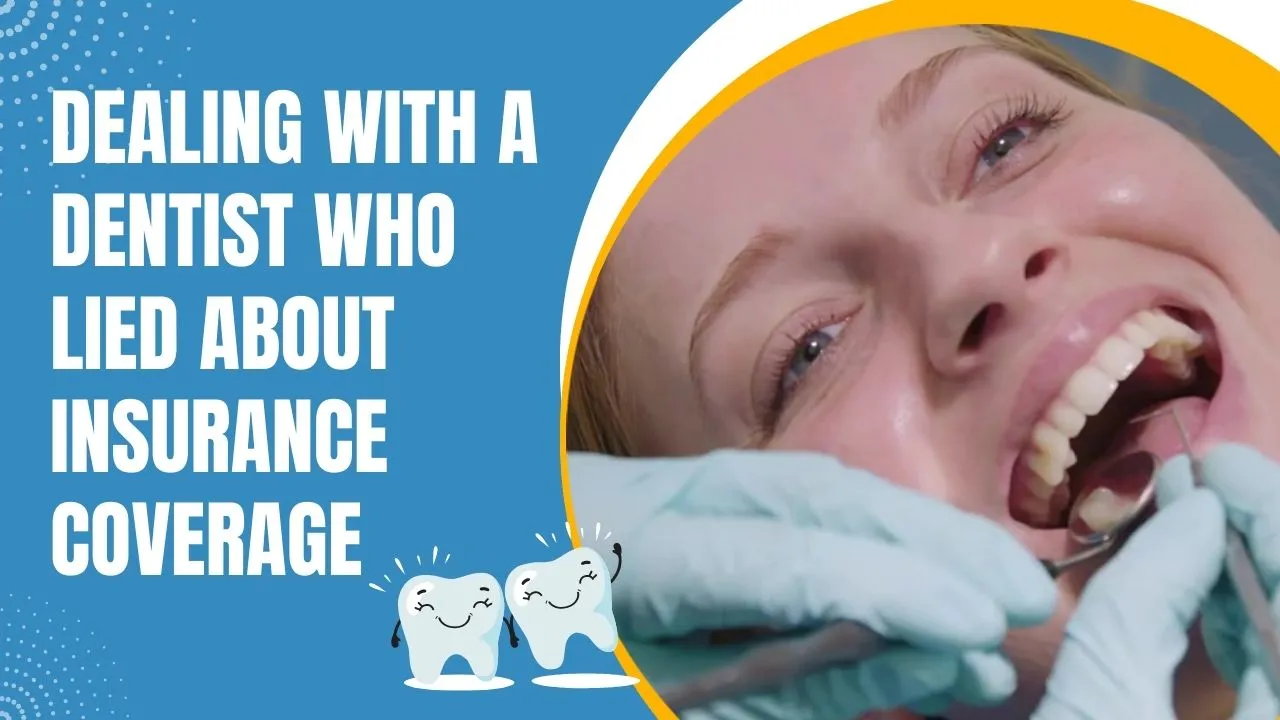According to some legal experts, you may have grounds to sue the dentist for misrepresentation or fraud if they knowingly lied to you about being in your insurance network.
However, it may be hard to prove your case if they deny telling you that or if you don’t have any written evidence. You may also have trouble collecting the judgment if they refuse to pay.
Write to the dentist’s office manager and explain the problem politely but firmly. Refund the difference between what you paid and what you would have paid if they were in your network. You might also express dissatisfaction with their care and unneeded therapies. They may fix it to avoid losing your company or a negative reputation.
Before seeing a doctor, verify with your insurer. Your insurance provider can only tell you about your policy’s advantages, including treatment fees and coverage. Your dentist is not qualified to say that.
Understanding Dental Insurance Fraud and Lying Dentists
Dental insurance fraud is a crime where an individual intentionally and unlawfully receives insurance money through deception. This can be done in a variety of ways both by the client and the dentist, such as:
- Billing for services not provided
- Billing for unnecessary or inaccurate services
- Misrepresenting dates of services
- Billing for a covered service when a non-covered service was performed
- Using a fake ID
- Waiving patient’s co-payment and deductible
Lying dentists are those who engage in dental insurance fraud or other unethical practices that violate the standards of care and professionalism expected from dental providers. Some warning signs of a fraudulent dentist are:
- Recommending excessive or unnecessary treatments.
- Charging fees that are higher than usual or customary.
- Failing to provide proper documentation or explanation of services.
- Refusing to give you copies of your records or x-rays.
- Pressuring you to accept treatment or pay upfront.
Dental insurance fraud and lying dentists can have a negative impact on patients in many ways, such as:
- Causing physical harm or complications from improper or unnecessary procedures.
- Wasting time and money on treatments that are not needed or covered by insurance.
- Losing benefits or coverage due to fraudulent claims or overbilling.
- Facing legal trouble or penalties for participating in or being unaware of the fraud.
- Suffering emotional distress or loss of trust from being deceived or mistreated.
Dental insurance fraud and lying dentists can also face serious legal consequences for their actions, such as:
- Fines, restitution, or damages
- Loss of professional license or accreditation
- Criminal charges or imprisonment
- Civil lawsuits or arbitration
Steps to Take When Dealing with a Lying Dentist
Should you find yourself doubting the integrity of your dental insurance or the honesty of your dentist, the following measures can help safeguard your rights:
- Ensure you maintain comprehensive records of all dealings and proof, incorporating receipts, invoices, statements, x-rays, treatment outlines, consent forms, letters, and all other dental-care-related documents. Dates, times, names, and discuss details with your dentist or insurance firm should also be carefully noted.
- Look for guidance from a specialist in dental malpractice law. These attorneys concentrate on cases involving fraud, negligence, or contract breach by dental practitioners. They can provide insights into your legal possibilities, assess your case, collect evidence, negotiate with the concerned parties, and represent you in court if required.
- Wonder over other choices for dental care. If dissatisfaction with your present dentist persists, or if you believe you’ve received care below standard, switching to a more reliable and skilled provider may be a good move. Before consenting to any treatment or procedure, seeking a second opinion from a different dentist could be beneficial.
Legal Options for Dealing with a Lying Dentist
When faced with dental insurance fraud or dishonest dentistry, multiple legal alternatives for reparation and justice exist. Commonly utilized options include:
- Submitting a grievance to the state dental board, the supervisory entity responsible for dental licensure and disciplinary actions within each state. If your dentist has broken dental practice laws or regulations in your state, you can lodge a complaint. The board will investigate your grievance and, if justified, will discipline the offending dentist.
- Initiating a civil lawsuit for fraud or contract breach. This legal action allows you to sue your dentist if you suspect fraud or contract violation. You can request financial compensation for losses stemming from the fraud or contract breach, which could include medical costs, loss of income, pain, and distress, and punitive damages.
- Notifying the insurance provider or law enforcement. If you suspect a crime, you can report cases of dental insurance fraud or dishonest dentistry to your insurance company or law enforcement. Your insurance company may undertake its own probe and sanction the dentist or reimburse you for overpaid or refused claims. If sufficient evidence exists, law enforcement may also investigate and bring criminal charges against the dentist.
Dental insurance fraud and dishonest dentists present significant risks to your oral health, financial situation, and emotional state. If you have fallen victim to these wrongdoings, it’s imperative to act promptly to safeguard yourself and your rights.





